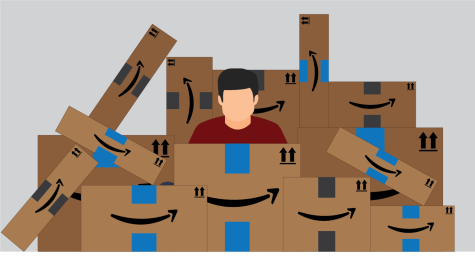Misgivings of more
Consequences of consumerism depend on the choices we make
January 27, 2022

“Shop ‘til You Drop.”
In the 90s game show, contestants ran up and down the stairs of a mock department store. Brands like Tide and Digornio’s appeared on set as if cameos in a movie. For the young couples, all-inclusive trips to Cabo or the Galapagos depended on their shopping. They were frantic and awkward and their nerves were visible. A lot was at stake. Coca-Cola or L’Oreal determined everything.
It feels good to get something, anything.
Millennials of the late 20th century were raised to love stuff. Think emerging electronics, suburban housing and department stores. Their version of the American Dream pictured personal empires. It shaped our population to be – and want to be – consumerist. Buying for the sake of buying has become a process accelerated and endorsed both by our economy and our culture. From here on out, it’s only moving faster.
Our generation shares the material values of our predecessors. We want the same cars, clothing and stuff marketed towards our parents. But today, there’s a convenience factor. It’s become easy to spend and acquire. While Stacy and Chris scale the stairs of a gameshow, I can simply tap to purchase. Last week it was a phone charger. Today was pad thai. And tomorrow, I hope SPU delivers my textbooks.
Getting stuff is effortless thanks to the pandemic. Cyber Monday has become synonymous with Black Friday, food delivery apps have overtaken dine-in, movies happen at home instead of the theater, and artwork is now NFT.
Despite dips in consumer spending, processes have changed to accelerate our economy. It’s an effort dictated by ease of accessibility and COVID-19. No matter what, industry adapts.
We’re being spoon-fed stuff. Life becomes indulgent and maybe we should feel guilty. But the free market is an inseparable ethos of our democracy. It’s becoming harder to keep people from participating in it, myself included.
Conclusion? It’s OK to love stuff. But there are some consequences.
Last summer, I worked for Amazon, in a small returns center inside of Whole Foods. I remember the young parents who would buy cans of cold brew while returning toys ordered by their tech-savvy toddler. I remember the elderly, floating their finger miles above the phone, searching for QR codes buried under menus and drop bars. My job was to scan and chuck items into large boxes. They would stack precariously on a pallet for the poor UPS man.
I experienced the plight of Amazon’s workforce, an automated, nonunionized, overworked machine. And I saw our waste, the volume at which we consume.
The logistics are terrible. Boxes I packed would end up somewhere at a warehouse in Las Vegas. Nothing guaranteed the items would ever be resold. For Amazon and its sellers, quality control and return shipping costs more than losing inventory. Money cannot be sacrificed.
Sometimes, I tell the customer to keep the return and still get their money back. This is hardly helpful. They look at me puzzled, wondering what they’re supposed to do with a shirt that doesn’t fit or a purchase they made by accident. I offer to dispose of it. It’s trashed alongside heaps of packaging material. The effect was cumulative, and visually, it was disturbing.
There are better ways to consume.
You’ve heard it before: stop buying. But buying is necessary. We need it to bring jobs back and increase our dollar’s value. It is the epicenter of our economy and, although arbitrary, measurement of our progress. So, the consumer must consider this: Don’t think about how much you spend. The amount is relative. Instead, imagine what you spend it on.
Where was the product manufactured? Does it produce waste? Does its production hurt people? Will I return it? Can I pay to fix something I already have?
There’s no authority forcing us to be sustainable. If anything, ‘going green’ might be a marketing tactic, something that doesn’t dent an industry’s practice. But being conscious is worth it. And it starts with the individual.
Promoting sustainability gives power to the consumer. It’s a pushback against tactics aimed to run both our wallets and our closet space dry. With change, trends will slow down; the quality of items will increase; waste will be reduced.
But as broke college students, maybe none of this matters. We might never see a personal purchase till our degree finally comes in the mail. Even so, the choice will eventually be ours. Spend wisely.


























































































